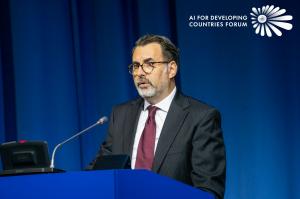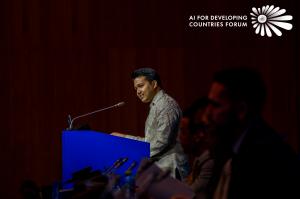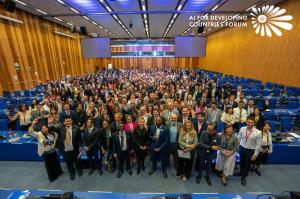Leaders at UN Vienna Forge $1.2 Trillion AI Investment Coalition for Global South

Olivier Grenet, Head Research Quality and AI Ambassador at Novartis, delivers keynote address at the AIFOD Vienna Summit 2025, where he was appointed as Senior Fellow and discussed how pharmaceutical companies are discovering innovative AI in developing markets.
AIFOD summit reveals how corporate partnerships with developing nations could unlock unprecedented market opportunities
AUSTRIA, July 31, 2025 /EINPresswire.com/ -- A groundbreaking coalition of corporate leaders emerged from the AI for Developing Countries Forum (AIFOD) summit at the United Nations Office at Vienna, with industry executives declaring that the Global South represents the most significant untapped AI market opportunity of the next decade—potentially worth $1.2 trillion by 2035.
The three-day summit brought together 600 delegates from over 120 countries, including CEOs, senior executives, and investment leaders who participated not as charitable donors, but as strategic partners recognizing that developing markets offer AI companies their most promising growth trajectories.
"We believe that AI and digital technologies can help small and medium enterprises access private sector opportunities," explained Jason Slater, Chief AI and Innovation Digital Officer at UNIDO, highlighting how international organizations are repositioning to facilitate these partnerships. "This isn't about aid—it's about unlocking markets."
The business case became compelling through economic data presented during the summit sessions. While AI markets in developed countries show growth rates of 19-20% annually, developing markets are experiencing explosive expansion: Brazil at 28.61%, India at 34.4%, and Indonesia at 28.65%. For corporate participants, these numbers represent the difference between incremental growth and transformational market expansion.
Olivier Grenet, Head Research Quality and AI ambassador at Novartis, who was appointed as one of five Senior Fellows to guide AIFOD's strategic direction, emphasized how pharmaceutical companies are discovering that AI applications in developing markets often prove more innovative than traditional approaches. "When you're forced to work with constraints, you often find more elegant solutions," Grenet noted.
The summit's central innovation was demonstrating how corporate engagement could be structured as strategic partnerships rather than traditional corporate social responsibility initiatives. The FAIR (Future AI Investment Responsibility) framework established concrete metrics that align business objectives with development outcomes, creating win-win scenarios that traditional aid models have struggled to achieve.
"How can public funds strategically de-risk private investments in AI infrastructure? Can we create financial vehicles that align development values with profitable returns?" asked The Honorable Brian Poe Llamanzares, Member of Congress from the Philippines, framing the question that dominated corporate executives' discussions throughout the summit.
Corporate participants heard compelling examples of successful models already generating returns. Off-grid solar programs have leveraged hundreds of millions in public investment to attract massive private capital, while rural technology initiatives demonstrate how modest initial investments can create substantial follow-on opportunities for corporate partners.
Juraj Hostak, Director of Innovation at Slovakia's Ministry of Investment, provided a government perspective that resonated with business leaders: "AI governance is not just technical, it's also political. You need leadership, trust and coordination." His presentation on adaptive governance frameworks showed how regulatory environments can evolve to support rather than constrain corporate innovation.
The summit revealed how traditional corporate strategies in developing markets often miss AI's transformative potential. Instead of viewing these markets as cost centers for outsourced operations, executives explored how AI applications developed for resource-constrained environments often prove superior to solutions designed for developed markets.
Laurent Lacroix, Chief Data Officer at INTERPOL, brought international law enforcement's perspective to discussions about data governance and security—critical concerns for corporate participants considering AI deployments across multiple jurisdictions. "This historic venue reminds us that the challenges we face require multilateral solutions," Lacroix emphasized.
For technology companies, the summit offered unprecedented access to government officials and development finance institutions willing to structure partnerships that share both risks and rewards. Traditional models that required companies to navigate complex aid bureaucracies gave way to discussions about joint ventures, risk-sharing mechanisms, and innovative financing structures.
The appointment of Senior Fellows with strong corporate credentials signals AIFOD's commitment to maintaining business perspectives in its strategic direction. Alongside Grenet from Novartis, the fellowship includes Carine Allaz, CEO and cybersecurity expert at CIRISK; Lorenzo Larini, CEO of MINT; Susana Falcão, Executive Director of Fondation Ondjyla; and Derrick T Davis, Director at University of Maryland Baltimore County.
Richard Malcolm Simbil, Counsel to the Ombudsman Commission of Papua New Guinea, provided insights particularly relevant to multinational corporations considering Pacific region investments. Speaking about serving 10.6 million people across thousands of islands, Simbil emphasized how effective governance frameworks can create stable environments for long-term corporate engagement.
The conference consensus that emerged from the summit establishes principles that corporate participants found attractive: emphasizing that "small countries are a driving force for a fair, respectful, accessible and sustainable use and development of AI" while committing to frameworks that reward innovation and protect intellectual property.
Perhaps most significantly for corporate participants, the summit demonstrated that developing market AI investments don't require companies to accept lower returns or higher risks than developed market opportunities. Instead, the FAIR framework shows how properly structured partnerships can deliver superior returns precisely because they address massive underserved markets with innovative solutions.
The emergence of "cooperative sovereignty" as a central theme resonated with multinational executives who have struggled with traditional either-or choices between global standardization and local adaptation. The frameworks developed during the summit show how companies can maintain operational efficiency while ensuring their AI systems reflect local values and serve community needs.
As corporate delegates departed the UN headquarters, many carried specific partnership agreements and pilot project commitments based on connections made during the intensive three-day program. The summit's emphasis on practical implementation over theoretical discussions appears to have generated concrete business opportunities that extend far beyond Vienna.
For the corporate world, the message from Vienna represents a fundamental shift: the Global South is no longer a market to be developed, but a partner in development. Through AIFOD's platform and proven frameworks, it's becoming the engine of AI industry growth.
Dawid Wiktor
Media Scope Group
email us here
Legal Disclaimer:
EIN Presswire provides this news content "as is" without warranty of any kind. We do not accept any responsibility or liability for the accuracy, content, images, videos, licenses, completeness, legality, or reliability of the information contained in this article. If you have any complaints or copyright issues related to this article, kindly contact the author above.
Conquer Termites Introduces Next‑Gen Technology For Rapid, Humane Termite Treatment In Southern Brisbane
WinTheView Announces Major Price Improvement to Empower Job Seekers with Affordable Career Portfolio Tools
The Buzz Marketing Presents Sa-Les: Innovative Headset Privacy Screen
Więcej ważnych informacji
 Jedynka Newserii
Jedynka Newserii

 Jedynka Newserii
Jedynka Newserii

Konsument

Grupa nowych biednych emerytów stale się powiększa. Ich świadczenie jest znacznie poniżej minimalnej emerytury
Przybywa osób, które z powodu zbyt krótkiego czasu opłacania składek pobierają emeryturę niższą od minimalnej. Tak zwanych nowych biednych emerytów jest w Polsce ok. 430 tys., a zdecydowaną większość grupy stanowią kobiety – wskazują badania ekspertów Instytutu Pracy i Spraw Socjalnych. W ich przypadku krótszy okres składkowy zwykle wynika z konieczności opieki nad dziećmi lub innymi osobami w rodzinie. Wśród innych powodów, wymienianych zarówno przez panie, jak i panów, są także praca za granicą lub na czarno oraz zły stan zdrowia.
Media i PR
M. Wawrykiewicz (PO): Postępowanie z art. 7 przeciw Węgrom pokazało iluzoryczność tej sankcji. Unia wywiera naciski poprzez negocjacje nowego budżetu

Przykład Węgier pokazał, że procedura z artykułu 7 traktatu o UE o łamanie praworządności nie ma mocy prawnej z powodu braku większości, nie mówiąc o jednomyślności wśród pozostałych państw członkowskich. Negocjacje nowego budżetu UE to dobry pretekst do zmiany sposobu części finansowania z pominięciem rządu centralnego. Czerwcowy marsz Pride w Budapeszcie pokazał, że część społeczeństwa, głównie stolica, jest przeciwna rządom Viktora Orbána, ale i na prowincji świadomość konsekwencji działań Fideszu staje się coraz większa przed przyszłorocznymi wyborami.
Firma
Blockchain zmienia rynek pracy i edukacji. Poszukiwane są osoby posiadające wiedzę z różnych dziedzin

Zapotrzebowanie na specjalistów od technologii blockchain dynamicznie rośnie – nie tylko w obszarze IT, ale również w administracji, finansach czy logistyce. Coraz więcej uczelni wprowadza programy związane z rozproszonymi rejestrami, które wyposażają studentów w umiejętności odpowiadające wymogom rynku.
Partner serwisu
Szkolenia

Akademia Newserii
Akademia Newserii to projekt, w ramach którego najlepsi polscy dziennikarze biznesowi, giełdowi oraz lifestylowi, a także szkoleniowcy z wieloletnim doświadczeniem dzielą się swoją wiedzą nt. pracy z mediami.



![Nestlé w Polsce podsumowuje wpływ na krajową gospodarkę. Firma wygenerowała 0,6 proc. polskiego PKB [DEPESZA]](https://www.newseria.pl/files/1097841585/fabryka-nesquik_1,w_85,r_png,_small.png)






.gif)

 |
| |
| |
|